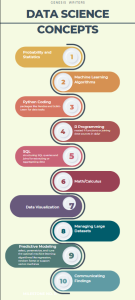Data Science Concepts Struggle Areas:
Data science concepts combines diverse concepts from statistics, computer science, and domain expertise, making it inherently interdisciplinary. This blending of distinct disciplines often creates comprehension challenges for students seeking to master data science. The most common struggle areas include grasping statistical principles, applying machine learning algorithms, leveraging programming languages like Python and R, structuring SQL queries, data visualization best practices, wrangling large datasets, and predictive modeling methods. Our expert data science tutors provide customized support that targets specific knowledge gaps, helping to clarify complex concepts. With tailored assistance demystifying key data science topics, students can shore up proficiency to excel academically and in future careers.
Probability and Statistics:
Understanding statistical confidence, p-values, hypothesis testing is challenging because it requires grasping theoretical mathematical concepts and how they apply to interpreting data. For example, a student analyzing results may struggle to correctly interpret a p-value to determine if their hypothesis should be accepted or rejected. Our tutors reinforce statistics knowledge with intuitive explanations, guided practice problems, and feedback to cement comprehension.
Machine Learning Projects and Algorithms:
Knowing how models work and differences between approaches like supervised vs unsupervised learning poses challenges. Such as, a researcher trying to apply classifiers to their dataset may become confused on choosing and tuning the best algorithm for their needs. Our mentors demystify Machine Learning techniques through simplified explanations, recommendations on approaches, and coding assistance.
Python Coding:
Students run into Python syntax issues, struggling to implement packages like Pandas and Scikit-Learn for data tasks. For instance, properly structuring code to cleanse datasets or trying to debug errors in model training code. Our programming experts resolve coding problems with detailed examples and debugging best practices.
R for Data Science:
Challenges occur in R’s syntax quirks and effectively leveraging tidyverse for analysis. Such as difficulty with nested R functions or joining data sources in dplyr for a class project analysis. Tutors provide R training tailored to academic use cases with workshops including practice datasets.
SQL:
Properly structuring SQL queries and joins for extracting or aggregating data poses prevalent issues. An example is crafting a complex academic database query across multiple tables to gather variables for a research question. We supply practice databases and verify query logic to strengthen SQL abilities.
Math/Calculus:
Students struggle with deriving and correctly applying complex mathematical formulas, integrals, multi-variable functions needed for data science techniques. For instance, properly using calculus extend machine learning modalities like neural networks or dimensionality reduction methods. Our tutors reinforce the required mathematical knowledge through explanations, step-by-step workings of formulas and checking application.
Data Visualization:
Difficulties choosing the appropriate plots, charts or graphs to effectively communicate findings and using libraries like Matplotlib or Tableau pose issues. Such as, trying to visualize support vector machine model results for a thesis. Our data visualization experts provide best practice recommendations along with coding help for libraries.
Managing Large Datasets:
Challenges arise in wrangling and extracting usable features from sizable, messy raw data. For example, scraping, cleaning and preprocessing niche social media or sensor data for a capstone analysis. Tutors demonstrate optimized big data techniques such as distributed computing and feature engineering tailored to project use cases.
Predictive Modeling:
Knowing how to select, parametrize, and tune the optimal machine learning algorithms like regression, random forest or support vector machines for given academic tasks is hugely impactful but challenging as there are endless combinations. Our mentors cut through the confusion with guided experimentation and performance benchmarking.
Communicating Findings:
Effectively compiling complex data science analyses with the right visual and written communication poses difficulties including presentation structuring and visualization choices. Such as struggling to pull all the analysis threads together into a impactful yet coherent final dissertation. Experts provide end-to-end guidance from analysis flow to draft reviews.
The infographic below shows the Data Science Concepts.



